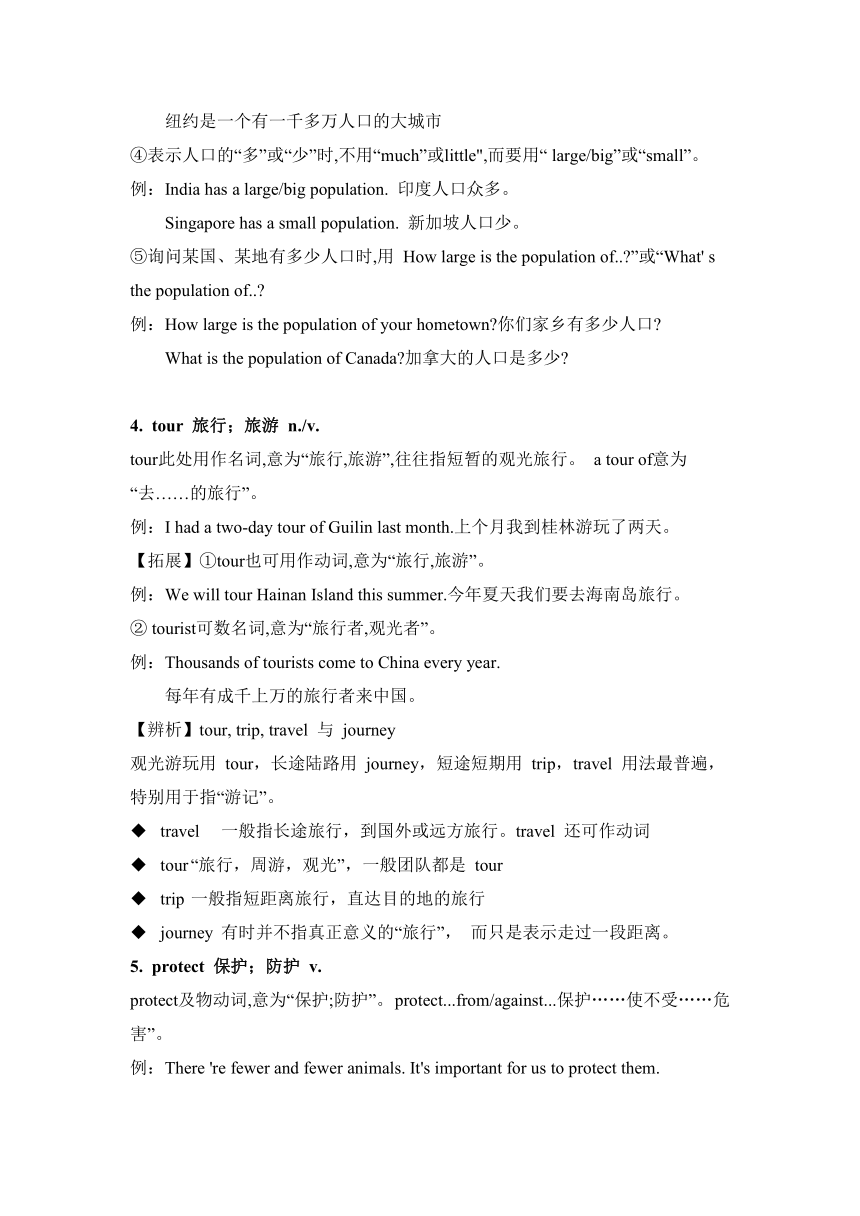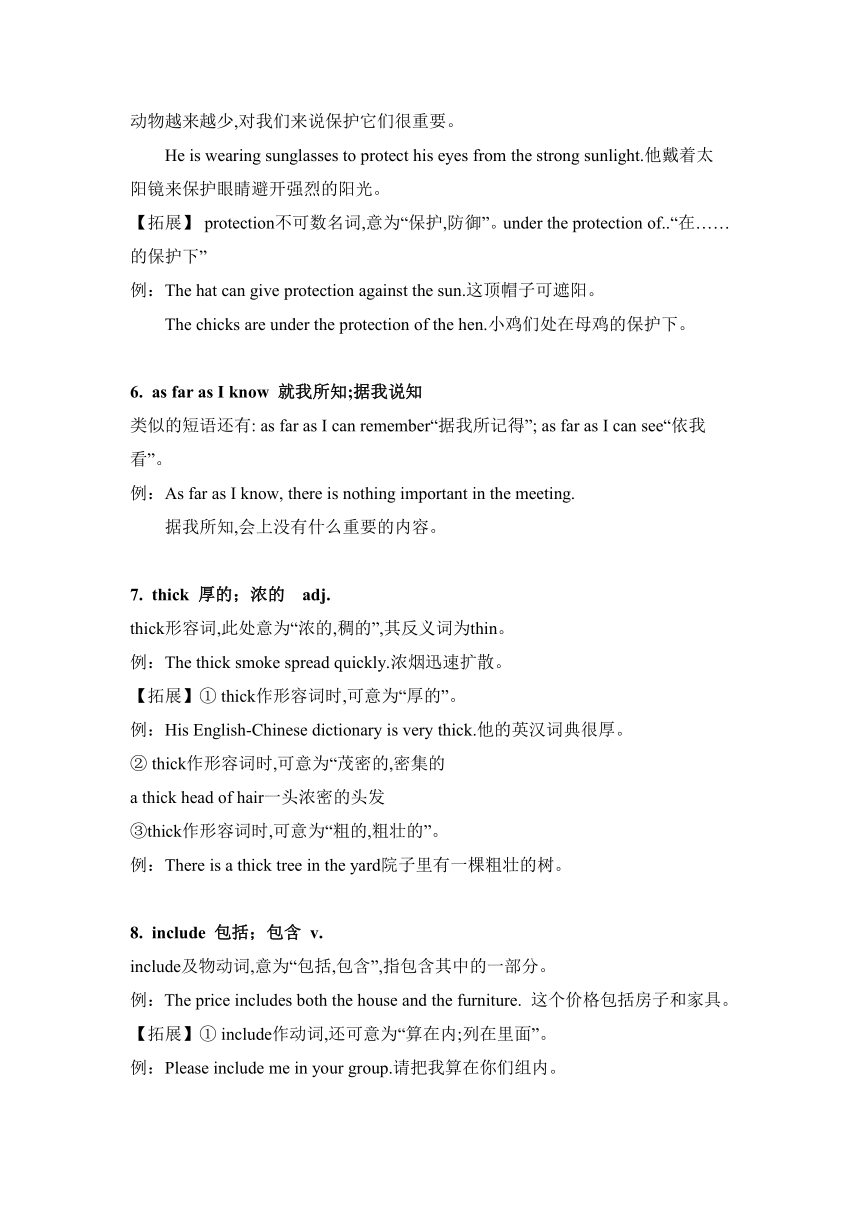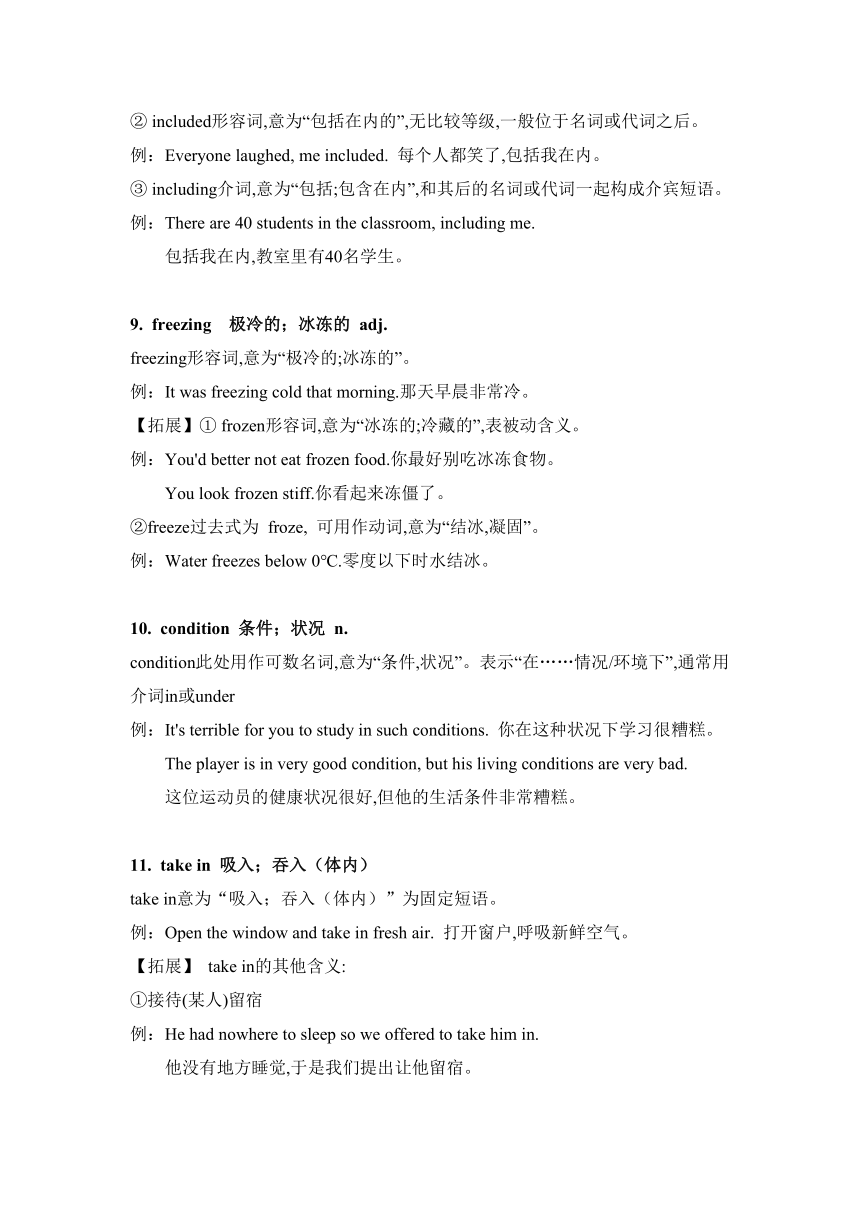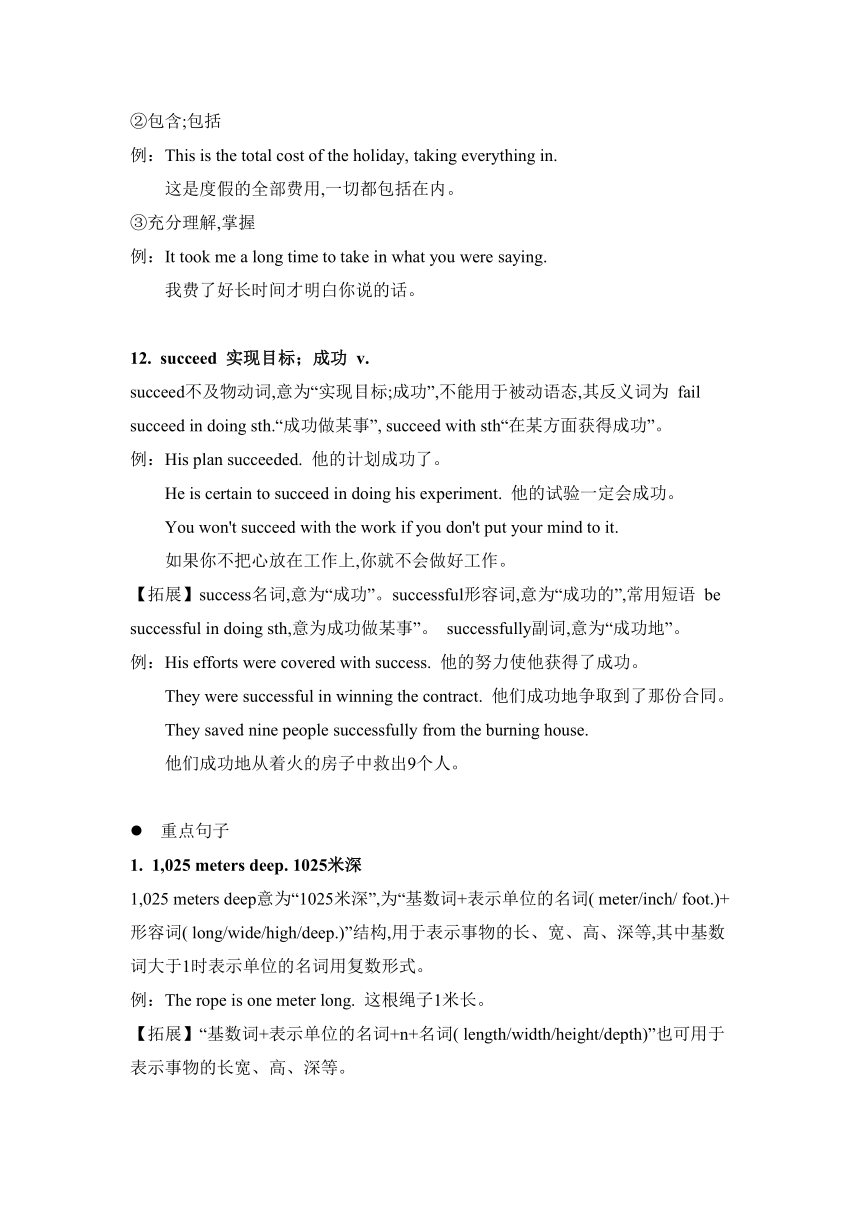鲁教版(五四制)英语八年级上册 Unit 5 What's the highest mountain in the world 知识点讲义
文档属性
| 名称 | 鲁教版(五四制)英语八年级上册 Unit 5 What's the highest mountain in the world 知识点讲义 |

|
|
| 格式 | docx | ||
| 文件大小 | 39.4KB | ||
| 资源类型 | 教案 | ||
| 版本资源 | 鲁教版 | ||
| 科目 | 英语 | ||
| 更新时间 | 2022-09-16 17:45:58 | ||
图片预览





文档简介
Unit 5 What’s the highest mountain in the world
Section A
重点单词及短语
deep 深的;纵深的 adj.
deep此处用作形容词,意为“深的;纵深的”,其名词形式为 depth“深(度)”。
例:Her love for the child is very deep她对这个孩子的爱是很深的。
Who can tell me the depth of the Caspian Sea 谁能告诉我里海的深度
【拓展】① deeply副词,意为“深深地”,常指抽象的,如情感方面的深。
例:We were deeply moved by the story我们被这个故事深深地感动了。
②deep也可用作副词,意为“深入地”,常指具体的深度,可说明深夜。常构成固定短语 deep in/into“深陷(于);专心致志(于)”。
例:My father often works deep in/into the night.我爸爸经常工作至深夜。
desert 沙漠;荒漠 n.
desert名词,in the desert 在沙漠里
例:This area of the country is mostly desert.该国的这一地区大部分是沙漠。
population 人口;人口数量 n.
population是一个集合名词,意为“人口;人口数量”。常用用法:
① population常与定冠词the连用,单独作主语时,谓语动词常用第三人称单数形式。
例:The world's population is increasing faster and faster.
全世界人口增长得越来越快。
②当“分数/百分数+of+ the population”作主语时,谓语动词习惯上用复数形式。
例:About seventy percent of the population in the country are farmers.
该国大约有百分之七十的人口是农民。
③有时 population可用作可数名词,其前可用不定冠词。
例:New York is a big city with a population of over10 million.
纽约是一个有一千多万人口的大城市
④表示人口的“多”或“少”时,不用“much”或little",而要用“ large/big”或“small”。
例:India has a large/big population. 印度人口众多。
Singapore has a small population. 新加坡人口少。
⑤询问某国、某地有多少人口时,用 How large is the population of.. ”或“What' s the population of..
例:How large is the population of your hometown 你们家乡有多少人口
What is the population of Canada 加拿大的人口是多少
tour 旅行;旅游 n./v.
tour此处用作名词,意为“旅行,旅游”,往往指短暂的观光旅行。 a tour of意为“去……的旅行”。
例:I had a two-day tour of Guilin last month.上个月我到桂林游玩了两天。
【拓展】①tour也可用作动词,意为“旅行,旅游”。
例:We will tour Hainan Island this summer.今年夏天我们要去海南岛旅行。
② tourist可数名词,意为“旅行者,观光者”。
例:Thousands of tourists come to China every year.
每年有成千上万的旅行者来中国。
【辨析】tour, trip, travel 与 journey
观光游玩用 tour,长途陆路用 journey,短途短期用 trip,travel 用法最普遍,特别用于指“游记”。
travel 一般指长途旅行,到国外或远方旅行。travel 还可作动词
tour “旅行,周游,观光”,一般团队都是 tour
trip 一般指短距离旅行,直达目的地的旅行
journey 有时并不指真正意义的“旅行”, 而只是表示走过一段距离。
protect 保护;防护 v.
protect及物动词,意为“保护;防护”。 protect...from/against...保护……使不受……危害”。
例:There 're fewer and fewer animals. It's important for us to protect them.
动物越来越少,对我们来说保护它们很重要。
He is wearing sunglasses to protect his eyes from the strong sunlight.他戴着太阳镜来保护眼睛避开强烈的阳光。
【拓展】 protection不可数名词,意为“保护,防御”。under the protection of..“在……的保护下”
例:The hat can give protection against the sun.这顶帽子可遮阳。
The chicks are under the protection of the hen.小鸡们处在母鸡的保护下。
as far as I know 就我所知;据我说知
类似的短语还有: as far as I can remember“据我所记得”; as far as I can see“依我看”。
例:As far as I know, there is nothing important in the meeting.
据我所知,会上没有什么重要的内容。
thick 厚的;浓的 adj.
thick形容词,此处意为“浓的,稠的”,其反义词为thin。
例:The thick smoke spread quickly.浓烟迅速扩散。
【拓展】① thick作形容词时,可意为“厚的”。
例:His English-Chinese dictionary is very thick.他的英汉词典很厚。
② thick作形容词时,可意为“茂密的,密集的
a thick head of hair一头浓密的头发
③thick作形容词时,可意为“粗的,粗壮的”。
例:There is a thick tree in the yard院子里有一棵粗壮的树。
include 包括;包含 v.
include及物动词,意为“包括,包含”,指包含其中的一部分。
例:The price includes both the house and the furniture. 这个价格包括房子和家具。
【拓展】① include作动词,还可意为“算在内;列在里面”。
例:Please include me in your group.请把我算在你们组内。
② included形容词,意为“包括在内的”,无比较等级,一般位于名词或代词之后。
例:Everyone laughed, me included. 每个人都笑了,包括我在内。
③ including介词,意为“包括;包含在内”,和其后的名词或代词一起构成介宾短语。
例:There are 40 students in the classroom, including me.
包括我在内,教室里有40名学生。
freezing 极冷的;冰冻的 adj.
freezing形容词,意为“极冷的;冰冻的”。
例:It was freezing cold that morning.那天早晨非常冷。
【拓展】① frozen形容词,意为“冰冻的;冷藏的”,表被动含义。
例:You'd better not eat frozen food.你最好别吃冰冻食物。
You look frozen stiff.你看起来冻僵了。
②freeze过去式为 froze, 可用作动词,意为“结冰,凝固”。
例:Water freezes below 0℃.零度以下时水结冰。
condition 条件;状况 n.
condition此处用作可数名词,意为“条件,状况”。表示“在……情况/环境下”,通常用介词in或under
例:It's terrible for you to study in such conditions. 你在这种状况下学习很糟糕。
The player is in very good condition, but his living conditions are very bad.
这位运动员的健康状况很好,但他的生活条件非常糟糕。
take in 吸入;吞入(体内)
take in意为“吸入;吞入(体内)”为固定短语。
例:Open the window and take in fresh air. 打开窗户,呼吸新鲜空气。
【拓展】 take in的其他含义:
①接待(某人)留宿
例:He had nowhere to sleep so we offered to take him in.
他没有地方睡觉,于是我们提出让他留宿。
②包含;包括
例:This is the total cost of the holiday, taking everything in.
这是度假的全部费用,一切都包括在内。
③充分理解,掌握
例:It took me a long time to take in what you were saying.
我费了好长时间才明白你说的话。
succeed 实现目标;成功 v.
succeed不及物动词,意为“实现目标;成功”,不能用于被动语态,其反义词为 fail succeed in doing sth.“成功做某事”, succeed with sth“在某方面获得成功”。
例:His plan succeeded. 他的计划成功了。
He is certain to succeed in doing his experiment. 他的试验一定会成功。
You won't succeed with the work if you don't put your mind to it.
如果你不把心放在工作上,你就不会做好工作。
【拓展】success名词,意为“成功”。successful形容词,意为“成功的”,常用短语 be successful in doing sth,意为成功做某事”。 successfully副词,意为“成功地”。
例:His efforts were covered with success. 他的努力使他获得了成功。
They were successful in winning the contract. 他们成功地争取到了那份合同。
They saved nine people successfully from the burning house.
他们成功地从着火的房子中救出9个人。
重点句子
1,025 meters deep. 1025米深
1,025 meters deep意为“1025米深”,为“基数词+表示单位的名词( meter/inch/ foot.)+形容词( long/wide/high/deep.)”结构,用于表示事物的长、宽、高、深等,其中基数词大于1时表示单位的名词用复数形式。
例:The rope is one meter long. 这根绳子1米长。
【拓展】“基数词+表示单位的名词+n+名词( length/width/height/depth)”也可用于表示事物的长宽、高、深等。
例:Qomolangma is about 8844 meters in height. 珠穆朗玛峰大约8844米高。
8,84443 meters high. 8844.43米高
high此处用作形容词,意为“高的”,其名词形式为height“高度”。
例:How high this mountain is!这座山多么高啊!
The plane is flying at a height of 3, 000 meters.
这架飞机正在3000米的高空飞行。
【拓展】①high还可用作副词,意为“向高处;高”,侧重描述具体事物,如:水平、声音的高。
例:I jump higher than you do.我跳得比你跳得高。
② highly副词,意为“高水平地,高度地”,侧重描述抽象事物,如: speak highly of(高度赞扬)。
例:The teacher spoke highly of the brave boy. 老师高度赞扬了这个勇敢的男孩。
It has a much longer history than the US.它比美国的历史要长得多。
much此处用作副词,意为“……得多”,可修饰形容词或副词的比较级,表示程度。
例:Ann is much more careful than her brother. 安比她哥哥认真得多。
【拓展】比较级前常见的修饰语
两“多”(much, a lot) 两少( a little, a bit) 两“甚至”(even, still),
还有一个“远”(far)去了。
Ah, the most popular question!嗯,最普遍的问题!
popular形容词,意为“流行的;受欢迎的;大众的”。be popular with意为“受……欢迎”。
例:The girl likes popular songs. 这个女孩喜欢流行歌曲。
This movie is popular with young people. 这部电影受年轻人的欢迎。
【拓展】popularity名词,意为“普及,流行”
例:The new product jumped into popularity. 这种新产品一下子普及开来。
Yes, it's the most famous part. 是的,它是最有名的部分。
famous形容词,意为“著名的,出名的”,可用作表语或定语,相当于 known或well- known。
例:She is a famous artist. 她是一位著名的艺术家。
【拓展】① be famous for“因……而著名
例:China is famous for the Great Wall. 中国因长城而著名。
② be famous as“作为……而著名”。
例:Yao Ming is famous as a basketball player. 姚明作为一名篮球运动员而著名。
Facts and dangers. 事实与危险
danger此处用作可数名词,意为“危险”。 in danger“处于危险中的;濒危的”; out of danger“脱险”; the danger of…的危险”。 danger的反义词为 safety
例:We should protect the animals in danger.我们应该保护濒危动物。
【拓展】① dangerous形容词,意为“有危险的”,其反义词为safe
例:The traffic here is very dangerous for children.
这里的交通对孩子们来说很危险。
② dangerously副词,意为“危险地”,其反义词为safely
例:She was standing dangerously close to the fire. 她站得离火太近,有危险。
Thick clouds cover the top and snow can fall very hard.浓云覆盖着山顶,雪可能下的很大。
(1)cover此处用作及物动词,意为“遮盖;覆盖”。cover...with...用……遮盖
例:She covered her face with her hands. 她双手掩面。
【拓展】① be covered with“被……覆盖”
例:The ground is covered with thick snow. 地面被厚厚的积雪覆盖。
②cover还可用作可数名词,意为“(书刊的)封面;封皮”。
例:The cover of the book is very nice. 这本书的封面很漂亮。
(2)hard此处用作副词,意为“沉重地;大量地”,此时相当于 heavily
例:It's raining hard/heavily outside. 外面雨下得正大。
【拓展】hard作副词时还意为“努力地”。hardly副词,“几乎不”表否定含义。
例:We must study hard and get good grades. 我们必须努力学习取得好成绩。
I can hardly say anything. 我几乎说不出话。
...while the first woman to succeed was JunkoTabei from Japan in1975.…而在1975年,第个成功登上珠穆朗玛峰的女性是来自日本的田部井淳子。
the first. to do sth.意为“第一个做某事的
例:He is always the first one to arrive here. 他总是第一个到这儿的人。
Shen Nong was the first person to discover tea. 神农是第一个发现茶的人。
One of the main reasons is that people want to challenge themselves in the face of difficulties. 最主要的原因之一是人们想在面对困难时挑战自己。
challenge此处用作动词,意为“挑战,考验”。challenge sb.( to sth.)“(就某事)向某人挑战”。
例:Tom challenged me to a game of chess. 汤姆向我挑战要下一盘棋。
(2)in the face of意为“面对(问题、困难等)”。此处face用作名词。
例:She showed great courage in the face of danger.
面对危险她表现出了巨大的勇气。
【拓展】①face用作名词时,意为“脸,面部”。
例:He has a round face. 他长着一张圆脸
②face用作动词时,意为“面对;面向”
例:Teenagers must face many challenges. 青少年必须面对许多挑战。
The spirit of these climbers shows us that we should never give up trying to achieve our dreams. 这些登山者的精神向我们证明:我们决不应该放弃尝试实现我们的梦想。
achieve此处用作及物动词,意为“达到;完成;成功”,其宾语可以是“实现”的目标、梦想等,也可以是“取得”的胜利成功、名誉、地位等。
例:Everybody should try hard to achieve their aims.
每个人都应该努力实现自己的目标。
【拓展】achievement名词,意为“成就,业绩(可数);实现,达到,成功(不可数)”。
例:We felt a great sense of achievement when we reached the top of the mountain.当我们到达山顶时,我们有一种巨大的成就感。
It also shows that humans can sometimes be stronger than the forces of nature.它也展示了人类有时比自然界的力量更强大。
sometimes副词,意为“有时”,相当于 at times.
例:Sometimes I go to school on foot. 有时我步行去上学。
【辨析】 sometimes, some times, sometime与 some time
sometimes 有时 表示动作发生的频率 用 how often提问
例:I sometimes hang out with my friends. 我有时和我的朋友闲逛。
some times 几次;几倍 time此处表示“次数;倍数”,为可数名词 用 how many times提问
例:This tree is some times taller than that one. 这棵树比那棵树高好几倍。
sometime 某个时间 用于指过去或将来不确定的时间点 用when提问
例:We will visit Beijing sometime next month. 下个月某个时间我们将游览北京。
some time 一段时间 用来表示一段时间 用 how long提问
例:He has waited at the school gate for some time. 他已经在校门口等了一段时间。
nature此处用作不可数名词,意为“大自然;自然界”。in nature“在自然界中”。
例:We can find many materials in nature. 在自然界中我们能找到很多材料。
【拓展】 natural可用作形容词,意为“自然的;天然的;非人力所为的;天生的”。
例:The country's natural resources include forests, coal and oil.
这个国家的自然资源包括森林、煤和石油。
Why do so many people try to climb this mountain even though it is dangerous 虽然它危险,但为什么这么多人试图攀登这座山
even though意为“即使,虽然”,引导让步状语从句,与 even if同义。它们不能与but连用。
例:Even though/if he is 24 now, he is still like a little child.
虽然他现在24岁了,但是他还像个小孩子。
Section B
重点单词及短语
weigh 重量是……;称……的重量 v.
weigh动词,意为“重量是……;称……的重量”。
①表示“重(多少)”,是连系动词。
例:He weighs 60 kilos.他重60千克。
②表示“称……的重量”,是及物动词。
例:He weighed the fish.他称了这条鱼。
③ weigh常与much或it连用,表示“重”或“轻”。
例:He weighs the least in his class.他在班里最轻。
④若提问重量,疑问词用 how much或what
例:What/How much do you weigh 你的体重是多少
【拓展】weight可用作不可数名词,意为“重量,体重”,常构成固定短语 the weight of,意为“……的重量”,What' s the weight of. 意为“……的重量是多少 ”。
例:What' s the weight of the sheep 这只羊的重量是多少
keeper 饲养员;保管人 n.
keeper名词,意为“饲养员;保管人”。由keep+er”构成。其动词形式为keep,意为“饲养;保管”
例:His father is a keeper at the museum. 他父亲是博物馆的保管人。
with excitement 兴奋地
with excitement意为“兴奋地”,在句中作方式状语,相当于副词 excitedly。 excitement为名词,意为“激动,兴奋”。
例:When the children saw their teacher, they ran over to her with excitement.
当孩子们看到他们的老师时他们兴奋地向她跑了过去。
illness 疾病;病
illness,名词,意为“疾病;病”,通常指因病而导致的不健康的状态。其形容词形式为ill,意为有病的,不适的。
例:He can' t come because of his illness. 他因病不能来。
【拓展】disease名词,意为“疾病;病”,通常指具体的某种疾病。
例:He got a disease during the war. 战争期间他患上了一种疾病。
重点句子
This elephant weighs many times more than this panda.这头大象比这只大熊猫重许多倍。
many times more than意为“比……多许多倍”。常见的倍数表达法有:
①“A+be实义动词+倍数+形容词或副词的比较级+than+B”表示“A比B大(长、高、宽等)多少倍”。
例:This hall is five times bigger than our classroom.
这个大厅比我们的教室大四倍(是我们的教室的五倍大)
The car runs twice faster than that truck.
这辆汽车的速度比那辆卡车快一倍(是那辆卡车的两倍快)。
②“A+be/实义动词+倍数+as+形容词或副词的原级+as+B”表示“A是B的多少倍”。例:Asia is four times as large as Europe.亚洲的面积是欧洲的四倍大。
An elephant weighs six times as much as a cow.
一头大象是一头奶牛的六倍重。
③“倍数+more+名词(可数或不可数)+than+被比较的对象”。
例:There are five times more books in our library than in yours.
我们图书馆里的书比你们图书馆里的书多四倍。
At 9: 00 a. m., they find that most of the babies are already awake and hungry.在上午九点钟,他们发现大多数的大熊猫幼崽已经醒来并且很饥饿。
awake形容词,意为“醒着的”,在句中常作表语。awake的反义词为 asleep,意为“睡着的”。
例:It's eleven at night; he is still awake. 夜里11点,他还没有睡。
【辨析】awake与wake
awake 形容词,意为“醒着的”,作表语
例:Is he awake or asleep 他醒着还是睡着
wake动词,意为“醒; 叫醒”,常与副词up连用
例:What time do you usually wake(up)?你通常在什么时候醒来
(2) hungry形容词,意为“饥饿的”,可作定语或表语。the hungry意为“饥民”。
例:Look at the hungry child. Let's help him. 看那个饥饿的孩子,让我们帮帮他
【拓展】 hunger不可数名词,意为“饥饿;饥荒”。
例:Many people died of hunger in the past. 过去很多人死于饥饿。
The babies often die from illnesses and do not live very long.这些幼崽经常死于疾病并且活不太长。
【辨析】die from与 die of 两者都意为“因……而死”
die from表示因病而死时, 可与die of通用; die from常指死于灾害、事故、外伤等外因,通常带有突发性
例:He died from an accident/a wound/disease/over work/polluted air.
他死于事故/受伤/疾病/劳累/被污染的空气。
die of表示因病而死时, 可与 die from通用; die of一般表示死于疾病、饥饿、劳累等内因
例: He died of fear/disappointment/ disease/old age/hunger/cold.
他死于恐惧/失望/疾病/年老/饥饿/寒冷。
Adult pandas spend more than 12 hours a day eating about10 kilos of bamboo.成年大熊猫一天要花费超过12小时的时间吃掉大约10千克竹子。
spend time/money doing sth=spend time/money on sth意为“在某事上花费时间/金钱”,句子的主语应为人
例:Tom spent two days reading the book. 汤姆花了两天时间读这本书。
An education program in Chengdu teaches children about pandas and other endangered wild animals. 成都的一个教育项目向孩子教授关于大熊猫和其他濒危野生动物的知识。
education此处用作不可数名词,意为“教育”。get/receive an education意为“接受教育”。
例:Mary completed her formal education in 1995.
玛丽在1995年完成了她的正规教育。
【拓展】① educational形容词,意为“教育的;有关教育的”。
例:Watching TV can be very educational. 看电视能使人受到很多教益。
② educate及物动词,意为“教育”。 educate sb. on sth“对某人进行……的教育”, educate sb. to do sth“教育某人做某事”。
例:We should educate children on the dangers of drug taking.
我们应该对儿童进行吸毒危害的教育。
The teacher often educates us to care about the animals in danger.
老师经常教育我们关注濒危动物。
③ educator名词,意为“教育者;教育家”。
例:Confucius is one of the greatest educators in China.
孔子是中国最伟大的教育家之一。
④ educated形容词,意为“受过教育的;有教养的”。在句中常用副词well修饰。
例:She is a well educated lady.她是一位很有教养的女士。
They send people to schools to tell children about the importance of saving these animals他们派人到学校告诉孩子们拯救这些动物的重要性。
send 过去式为sent,此处用作及物动词,意为“派遣;打发”。 send sb. to do sth“派某人做某事”,send for sb.“派人去请某人”。
例:We sent him to buy milk.我们派他去买牛奶。
Your mother is ill. You must send for doctor.
你母亲病了。你必须派人去请医生。
【拓展】send作动词时,还可意为“送,寄”。Send sb.sth.= send sth. to sb.意为“把某物寄给某人”。
例:Did you send a postcard to your mother yesterday
=Did you send your mother a postcard yesterday
昨天你给你母亲寄明信片了吗
Water pollution水污染
pollution不可数名词,意为“污染”。其动词形式为pollute,意为“污染”,其形容词形式为 polluted,意为“被污染的
例:-What do you think of air pollution 你怎么看空气污染
-It' s terrible.太糟糕了。
Some kinds have teeth有些种类(的鲸)有牙齿
kind此处用作可数名词,意为“种类”。 a kind of“一种”, all kinds of“各种各样的”。这些短语修饰的名词作主语时,谓语动词的单复数形式应与kind保持一致。
例:This kind of car is made in Japan.这种汽车是日本生产的。
There are many kinds of flowers in the garden.花园里有许多种花。
【拓展】①kind还可用作形容词,意为“体贴的;友好的”,其名词形式为 kindness意为“体贴;善良”
例:It' s very kind of you to do so!你这样做太好了!
Thanks for your kindness感谢你的好意。
② kind of意为“稍微;有点儿”,修饰形容词或副词的原级,其同义词组为 a little,a bit和 a little bit
例:That movie made me feel kind of sad.那部电影让我感到有点儿难过。
Whale parts sold to make things like candles and soap鯨的身体部位被出售来制造像蜡烛和肥皂这样的物品
sell 过去式为sold, 此处用作及物动词,意为“销售;出售”。“ sell sth. for+钱”意为“把某物卖了…(钱)”,sell sb. sth.= sell sth. to sb.,意为“卖给某人某物”。
例:I sold James my car for $800.
= I sold my car to James for $800. 我把我的车以800美元的价格卖给了詹姆斯。
【拓展】①sell可用作不及物动词,意为“售出”,sell well意为“卖得好;畅销”。此时不用于被动语态。
例:The book sold well.这本书销路不错。
② sell out“售完”,是固定短语。
例:The shop sold out all the shirts. 那家商店卖完了所有的衬衫。
③sale名词,意为“出售;销售”。 for sale“待售”,on sale“降价销售”。
例:I'm sorry. This coat is not for sale. 抱歉,这件外套不卖。
Some kinds of whales are in danger because...因为……一些种类的鲸处于危险之中。
in danger意为“处于危险之中;濒危”,常作后置定语、表语。out of danger意为“脱离危险”。
例:The soldiers worked hard to save the people in danger.
战士们奋力抢救处于危险之中的人们。
【拓展】① dangerous形容词,意为“危险的”
例:It's very dangerous to play football on the road. 在马路上踢足球很危险。
② endangered形容词,意为“濒临灭绝的”。由en-+ danger+ed”构成。
例:We should try our best to save the endangered animals.
我们应该尽最大努力去拯救濒危动物。
Section A
重点单词及短语
deep 深的;纵深的 adj.
deep此处用作形容词,意为“深的;纵深的”,其名词形式为 depth“深(度)”。
例:Her love for the child is very deep她对这个孩子的爱是很深的。
Who can tell me the depth of the Caspian Sea 谁能告诉我里海的深度
【拓展】① deeply副词,意为“深深地”,常指抽象的,如情感方面的深。
例:We were deeply moved by the story我们被这个故事深深地感动了。
②deep也可用作副词,意为“深入地”,常指具体的深度,可说明深夜。常构成固定短语 deep in/into“深陷(于);专心致志(于)”。
例:My father often works deep in/into the night.我爸爸经常工作至深夜。
desert 沙漠;荒漠 n.
desert名词,in the desert 在沙漠里
例:This area of the country is mostly desert.该国的这一地区大部分是沙漠。
population 人口;人口数量 n.
population是一个集合名词,意为“人口;人口数量”。常用用法:
① population常与定冠词the连用,单独作主语时,谓语动词常用第三人称单数形式。
例:The world's population is increasing faster and faster.
全世界人口增长得越来越快。
②当“分数/百分数+of+ the population”作主语时,谓语动词习惯上用复数形式。
例:About seventy percent of the population in the country are farmers.
该国大约有百分之七十的人口是农民。
③有时 population可用作可数名词,其前可用不定冠词。
例:New York is a big city with a population of over10 million.
纽约是一个有一千多万人口的大城市
④表示人口的“多”或“少”时,不用“much”或little",而要用“ large/big”或“small”。
例:India has a large/big population. 印度人口众多。
Singapore has a small population. 新加坡人口少。
⑤询问某国、某地有多少人口时,用 How large is the population of.. ”或“What' s the population of..
例:How large is the population of your hometown 你们家乡有多少人口
What is the population of Canada 加拿大的人口是多少
tour 旅行;旅游 n./v.
tour此处用作名词,意为“旅行,旅游”,往往指短暂的观光旅行。 a tour of意为“去……的旅行”。
例:I had a two-day tour of Guilin last month.上个月我到桂林游玩了两天。
【拓展】①tour也可用作动词,意为“旅行,旅游”。
例:We will tour Hainan Island this summer.今年夏天我们要去海南岛旅行。
② tourist可数名词,意为“旅行者,观光者”。
例:Thousands of tourists come to China every year.
每年有成千上万的旅行者来中国。
【辨析】tour, trip, travel 与 journey
观光游玩用 tour,长途陆路用 journey,短途短期用 trip,travel 用法最普遍,特别用于指“游记”。
travel 一般指长途旅行,到国外或远方旅行。travel 还可作动词
tour “旅行,周游,观光”,一般团队都是 tour
trip 一般指短距离旅行,直达目的地的旅行
journey 有时并不指真正意义的“旅行”, 而只是表示走过一段距离。
protect 保护;防护 v.
protect及物动词,意为“保护;防护”。 protect...from/against...保护……使不受……危害”。
例:There 're fewer and fewer animals. It's important for us to protect them.
动物越来越少,对我们来说保护它们很重要。
He is wearing sunglasses to protect his eyes from the strong sunlight.他戴着太阳镜来保护眼睛避开强烈的阳光。
【拓展】 protection不可数名词,意为“保护,防御”。under the protection of..“在……的保护下”
例:The hat can give protection against the sun.这顶帽子可遮阳。
The chicks are under the protection of the hen.小鸡们处在母鸡的保护下。
as far as I know 就我所知;据我说知
类似的短语还有: as far as I can remember“据我所记得”; as far as I can see“依我看”。
例:As far as I know, there is nothing important in the meeting.
据我所知,会上没有什么重要的内容。
thick 厚的;浓的 adj.
thick形容词,此处意为“浓的,稠的”,其反义词为thin。
例:The thick smoke spread quickly.浓烟迅速扩散。
【拓展】① thick作形容词时,可意为“厚的”。
例:His English-Chinese dictionary is very thick.他的英汉词典很厚。
② thick作形容词时,可意为“茂密的,密集的
a thick head of hair一头浓密的头发
③thick作形容词时,可意为“粗的,粗壮的”。
例:There is a thick tree in the yard院子里有一棵粗壮的树。
include 包括;包含 v.
include及物动词,意为“包括,包含”,指包含其中的一部分。
例:The price includes both the house and the furniture. 这个价格包括房子和家具。
【拓展】① include作动词,还可意为“算在内;列在里面”。
例:Please include me in your group.请把我算在你们组内。
② included形容词,意为“包括在内的”,无比较等级,一般位于名词或代词之后。
例:Everyone laughed, me included. 每个人都笑了,包括我在内。
③ including介词,意为“包括;包含在内”,和其后的名词或代词一起构成介宾短语。
例:There are 40 students in the classroom, including me.
包括我在内,教室里有40名学生。
freezing 极冷的;冰冻的 adj.
freezing形容词,意为“极冷的;冰冻的”。
例:It was freezing cold that morning.那天早晨非常冷。
【拓展】① frozen形容词,意为“冰冻的;冷藏的”,表被动含义。
例:You'd better not eat frozen food.你最好别吃冰冻食物。
You look frozen stiff.你看起来冻僵了。
②freeze过去式为 froze, 可用作动词,意为“结冰,凝固”。
例:Water freezes below 0℃.零度以下时水结冰。
condition 条件;状况 n.
condition此处用作可数名词,意为“条件,状况”。表示“在……情况/环境下”,通常用介词in或under
例:It's terrible for you to study in such conditions. 你在这种状况下学习很糟糕。
The player is in very good condition, but his living conditions are very bad.
这位运动员的健康状况很好,但他的生活条件非常糟糕。
take in 吸入;吞入(体内)
take in意为“吸入;吞入(体内)”为固定短语。
例:Open the window and take in fresh air. 打开窗户,呼吸新鲜空气。
【拓展】 take in的其他含义:
①接待(某人)留宿
例:He had nowhere to sleep so we offered to take him in.
他没有地方睡觉,于是我们提出让他留宿。
②包含;包括
例:This is the total cost of the holiday, taking everything in.
这是度假的全部费用,一切都包括在内。
③充分理解,掌握
例:It took me a long time to take in what you were saying.
我费了好长时间才明白你说的话。
succeed 实现目标;成功 v.
succeed不及物动词,意为“实现目标;成功”,不能用于被动语态,其反义词为 fail succeed in doing sth.“成功做某事”, succeed with sth“在某方面获得成功”。
例:His plan succeeded. 他的计划成功了。
He is certain to succeed in doing his experiment. 他的试验一定会成功。
You won't succeed with the work if you don't put your mind to it.
如果你不把心放在工作上,你就不会做好工作。
【拓展】success名词,意为“成功”。successful形容词,意为“成功的”,常用短语 be successful in doing sth,意为成功做某事”。 successfully副词,意为“成功地”。
例:His efforts were covered with success. 他的努力使他获得了成功。
They were successful in winning the contract. 他们成功地争取到了那份合同。
They saved nine people successfully from the burning house.
他们成功地从着火的房子中救出9个人。
重点句子
1,025 meters deep. 1025米深
1,025 meters deep意为“1025米深”,为“基数词+表示单位的名词( meter/inch/ foot.)+形容词( long/wide/high/deep.)”结构,用于表示事物的长、宽、高、深等,其中基数词大于1时表示单位的名词用复数形式。
例:The rope is one meter long. 这根绳子1米长。
【拓展】“基数词+表示单位的名词+n+名词( length/width/height/depth)”也可用于表示事物的长宽、高、深等。
例:Qomolangma is about 8844 meters in height. 珠穆朗玛峰大约8844米高。
8,84443 meters high. 8844.43米高
high此处用作形容词,意为“高的”,其名词形式为height“高度”。
例:How high this mountain is!这座山多么高啊!
The plane is flying at a height of 3, 000 meters.
这架飞机正在3000米的高空飞行。
【拓展】①high还可用作副词,意为“向高处;高”,侧重描述具体事物,如:水平、声音的高。
例:I jump higher than you do.我跳得比你跳得高。
② highly副词,意为“高水平地,高度地”,侧重描述抽象事物,如: speak highly of(高度赞扬)。
例:The teacher spoke highly of the brave boy. 老师高度赞扬了这个勇敢的男孩。
It has a much longer history than the US.它比美国的历史要长得多。
much此处用作副词,意为“……得多”,可修饰形容词或副词的比较级,表示程度。
例:Ann is much more careful than her brother. 安比她哥哥认真得多。
【拓展】比较级前常见的修饰语
两“多”(much, a lot) 两少( a little, a bit) 两“甚至”(even, still),
还有一个“远”(far)去了。
Ah, the most popular question!嗯,最普遍的问题!
popular形容词,意为“流行的;受欢迎的;大众的”。be popular with意为“受……欢迎”。
例:The girl likes popular songs. 这个女孩喜欢流行歌曲。
This movie is popular with young people. 这部电影受年轻人的欢迎。
【拓展】popularity名词,意为“普及,流行”
例:The new product jumped into popularity. 这种新产品一下子普及开来。
Yes, it's the most famous part. 是的,它是最有名的部分。
famous形容词,意为“著名的,出名的”,可用作表语或定语,相当于 known或well- known。
例:She is a famous artist. 她是一位著名的艺术家。
【拓展】① be famous for“因……而著名
例:China is famous for the Great Wall. 中国因长城而著名。
② be famous as“作为……而著名”。
例:Yao Ming is famous as a basketball player. 姚明作为一名篮球运动员而著名。
Facts and dangers. 事实与危险
danger此处用作可数名词,意为“危险”。 in danger“处于危险中的;濒危的”; out of danger“脱险”; the danger of…的危险”。 danger的反义词为 safety
例:We should protect the animals in danger.我们应该保护濒危动物。
【拓展】① dangerous形容词,意为“有危险的”,其反义词为safe
例:The traffic here is very dangerous for children.
这里的交通对孩子们来说很危险。
② dangerously副词,意为“危险地”,其反义词为safely
例:She was standing dangerously close to the fire. 她站得离火太近,有危险。
Thick clouds cover the top and snow can fall very hard.浓云覆盖着山顶,雪可能下的很大。
(1)cover此处用作及物动词,意为“遮盖;覆盖”。cover...with...用……遮盖
例:She covered her face with her hands. 她双手掩面。
【拓展】① be covered with“被……覆盖”
例:The ground is covered with thick snow. 地面被厚厚的积雪覆盖。
②cover还可用作可数名词,意为“(书刊的)封面;封皮”。
例:The cover of the book is very nice. 这本书的封面很漂亮。
(2)hard此处用作副词,意为“沉重地;大量地”,此时相当于 heavily
例:It's raining hard/heavily outside. 外面雨下得正大。
【拓展】hard作副词时还意为“努力地”。hardly副词,“几乎不”表否定含义。
例:We must study hard and get good grades. 我们必须努力学习取得好成绩。
I can hardly say anything. 我几乎说不出话。
...while the first woman to succeed was JunkoTabei from Japan in1975.…而在1975年,第个成功登上珠穆朗玛峰的女性是来自日本的田部井淳子。
the first. to do sth.意为“第一个做某事的
例:He is always the first one to arrive here. 他总是第一个到这儿的人。
Shen Nong was the first person to discover tea. 神农是第一个发现茶的人。
One of the main reasons is that people want to challenge themselves in the face of difficulties. 最主要的原因之一是人们想在面对困难时挑战自己。
challenge此处用作动词,意为“挑战,考验”。challenge sb.( to sth.)“(就某事)向某人挑战”。
例:Tom challenged me to a game of chess. 汤姆向我挑战要下一盘棋。
(2)in the face of意为“面对(问题、困难等)”。此处face用作名词。
例:She showed great courage in the face of danger.
面对危险她表现出了巨大的勇气。
【拓展】①face用作名词时,意为“脸,面部”。
例:He has a round face. 他长着一张圆脸
②face用作动词时,意为“面对;面向”
例:Teenagers must face many challenges. 青少年必须面对许多挑战。
The spirit of these climbers shows us that we should never give up trying to achieve our dreams. 这些登山者的精神向我们证明:我们决不应该放弃尝试实现我们的梦想。
achieve此处用作及物动词,意为“达到;完成;成功”,其宾语可以是“实现”的目标、梦想等,也可以是“取得”的胜利成功、名誉、地位等。
例:Everybody should try hard to achieve their aims.
每个人都应该努力实现自己的目标。
【拓展】achievement名词,意为“成就,业绩(可数);实现,达到,成功(不可数)”。
例:We felt a great sense of achievement when we reached the top of the mountain.当我们到达山顶时,我们有一种巨大的成就感。
It also shows that humans can sometimes be stronger than the forces of nature.它也展示了人类有时比自然界的力量更强大。
sometimes副词,意为“有时”,相当于 at times.
例:Sometimes I go to school on foot. 有时我步行去上学。
【辨析】 sometimes, some times, sometime与 some time
sometimes 有时 表示动作发生的频率 用 how often提问
例:I sometimes hang out with my friends. 我有时和我的朋友闲逛。
some times 几次;几倍 time此处表示“次数;倍数”,为可数名词 用 how many times提问
例:This tree is some times taller than that one. 这棵树比那棵树高好几倍。
sometime 某个时间 用于指过去或将来不确定的时间点 用when提问
例:We will visit Beijing sometime next month. 下个月某个时间我们将游览北京。
some time 一段时间 用来表示一段时间 用 how long提问
例:He has waited at the school gate for some time. 他已经在校门口等了一段时间。
nature此处用作不可数名词,意为“大自然;自然界”。in nature“在自然界中”。
例:We can find many materials in nature. 在自然界中我们能找到很多材料。
【拓展】 natural可用作形容词,意为“自然的;天然的;非人力所为的;天生的”。
例:The country's natural resources include forests, coal and oil.
这个国家的自然资源包括森林、煤和石油。
Why do so many people try to climb this mountain even though it is dangerous 虽然它危险,但为什么这么多人试图攀登这座山
even though意为“即使,虽然”,引导让步状语从句,与 even if同义。它们不能与but连用。
例:Even though/if he is 24 now, he is still like a little child.
虽然他现在24岁了,但是他还像个小孩子。
Section B
重点单词及短语
weigh 重量是……;称……的重量 v.
weigh动词,意为“重量是……;称……的重量”。
①表示“重(多少)”,是连系动词。
例:He weighs 60 kilos.他重60千克。
②表示“称……的重量”,是及物动词。
例:He weighed the fish.他称了这条鱼。
③ weigh常与much或it连用,表示“重”或“轻”。
例:He weighs the least in his class.他在班里最轻。
④若提问重量,疑问词用 how much或what
例:What/How much do you weigh 你的体重是多少
【拓展】weight可用作不可数名词,意为“重量,体重”,常构成固定短语 the weight of,意为“……的重量”,What' s the weight of. 意为“……的重量是多少 ”。
例:What' s the weight of the sheep 这只羊的重量是多少
keeper 饲养员;保管人 n.
keeper名词,意为“饲养员;保管人”。由keep+er”构成。其动词形式为keep,意为“饲养;保管”
例:His father is a keeper at the museum. 他父亲是博物馆的保管人。
with excitement 兴奋地
with excitement意为“兴奋地”,在句中作方式状语,相当于副词 excitedly。 excitement为名词,意为“激动,兴奋”。
例:When the children saw their teacher, they ran over to her with excitement.
当孩子们看到他们的老师时他们兴奋地向她跑了过去。
illness 疾病;病
illness,名词,意为“疾病;病”,通常指因病而导致的不健康的状态。其形容词形式为ill,意为有病的,不适的。
例:He can' t come because of his illness. 他因病不能来。
【拓展】disease名词,意为“疾病;病”,通常指具体的某种疾病。
例:He got a disease during the war. 战争期间他患上了一种疾病。
重点句子
This elephant weighs many times more than this panda.这头大象比这只大熊猫重许多倍。
many times more than意为“比……多许多倍”。常见的倍数表达法有:
①“A+be实义动词+倍数+形容词或副词的比较级+than+B”表示“A比B大(长、高、宽等)多少倍”。
例:This hall is five times bigger than our classroom.
这个大厅比我们的教室大四倍(是我们的教室的五倍大)
The car runs twice faster than that truck.
这辆汽车的速度比那辆卡车快一倍(是那辆卡车的两倍快)。
②“A+be/实义动词+倍数+as+形容词或副词的原级+as+B”表示“A是B的多少倍”。例:Asia is four times as large as Europe.亚洲的面积是欧洲的四倍大。
An elephant weighs six times as much as a cow.
一头大象是一头奶牛的六倍重。
③“倍数+more+名词(可数或不可数)+than+被比较的对象”。
例:There are five times more books in our library than in yours.
我们图书馆里的书比你们图书馆里的书多四倍。
At 9: 00 a. m., they find that most of the babies are already awake and hungry.在上午九点钟,他们发现大多数的大熊猫幼崽已经醒来并且很饥饿。
awake形容词,意为“醒着的”,在句中常作表语。awake的反义词为 asleep,意为“睡着的”。
例:It's eleven at night; he is still awake. 夜里11点,他还没有睡。
【辨析】awake与wake
awake 形容词,意为“醒着的”,作表语
例:Is he awake or asleep 他醒着还是睡着
wake动词,意为“醒; 叫醒”,常与副词up连用
例:What time do you usually wake(up)?你通常在什么时候醒来
(2) hungry形容词,意为“饥饿的”,可作定语或表语。the hungry意为“饥民”。
例:Look at the hungry child. Let's help him. 看那个饥饿的孩子,让我们帮帮他
【拓展】 hunger不可数名词,意为“饥饿;饥荒”。
例:Many people died of hunger in the past. 过去很多人死于饥饿。
The babies often die from illnesses and do not live very long.这些幼崽经常死于疾病并且活不太长。
【辨析】die from与 die of 两者都意为“因……而死”
die from表示因病而死时, 可与die of通用; die from常指死于灾害、事故、外伤等外因,通常带有突发性
例:He died from an accident/a wound/disease/over work/polluted air.
他死于事故/受伤/疾病/劳累/被污染的空气。
die of表示因病而死时, 可与 die from通用; die of一般表示死于疾病、饥饿、劳累等内因
例: He died of fear/disappointment/ disease/old age/hunger/cold.
他死于恐惧/失望/疾病/年老/饥饿/寒冷。
Adult pandas spend more than 12 hours a day eating about10 kilos of bamboo.成年大熊猫一天要花费超过12小时的时间吃掉大约10千克竹子。
spend time/money doing sth=spend time/money on sth意为“在某事上花费时间/金钱”,句子的主语应为人
例:Tom spent two days reading the book. 汤姆花了两天时间读这本书。
An education program in Chengdu teaches children about pandas and other endangered wild animals. 成都的一个教育项目向孩子教授关于大熊猫和其他濒危野生动物的知识。
education此处用作不可数名词,意为“教育”。get/receive an education意为“接受教育”。
例:Mary completed her formal education in 1995.
玛丽在1995年完成了她的正规教育。
【拓展】① educational形容词,意为“教育的;有关教育的”。
例:Watching TV can be very educational. 看电视能使人受到很多教益。
② educate及物动词,意为“教育”。 educate sb. on sth“对某人进行……的教育”, educate sb. to do sth“教育某人做某事”。
例:We should educate children on the dangers of drug taking.
我们应该对儿童进行吸毒危害的教育。
The teacher often educates us to care about the animals in danger.
老师经常教育我们关注濒危动物。
③ educator名词,意为“教育者;教育家”。
例:Confucius is one of the greatest educators in China.
孔子是中国最伟大的教育家之一。
④ educated形容词,意为“受过教育的;有教养的”。在句中常用副词well修饰。
例:She is a well educated lady.她是一位很有教养的女士。
They send people to schools to tell children about the importance of saving these animals他们派人到学校告诉孩子们拯救这些动物的重要性。
send 过去式为sent,此处用作及物动词,意为“派遣;打发”。 send sb. to do sth“派某人做某事”,send for sb.“派人去请某人”。
例:We sent him to buy milk.我们派他去买牛奶。
Your mother is ill. You must send for doctor.
你母亲病了。你必须派人去请医生。
【拓展】send作动词时,还可意为“送,寄”。Send sb.sth.= send sth. to sb.意为“把某物寄给某人”。
例:Did you send a postcard to your mother yesterday
=Did you send your mother a postcard yesterday
昨天你给你母亲寄明信片了吗
Water pollution水污染
pollution不可数名词,意为“污染”。其动词形式为pollute,意为“污染”,其形容词形式为 polluted,意为“被污染的
例:-What do you think of air pollution 你怎么看空气污染
-It' s terrible.太糟糕了。
Some kinds have teeth有些种类(的鲸)有牙齿
kind此处用作可数名词,意为“种类”。 a kind of“一种”, all kinds of“各种各样的”。这些短语修饰的名词作主语时,谓语动词的单复数形式应与kind保持一致。
例:This kind of car is made in Japan.这种汽车是日本生产的。
There are many kinds of flowers in the garden.花园里有许多种花。
【拓展】①kind还可用作形容词,意为“体贴的;友好的”,其名词形式为 kindness意为“体贴;善良”
例:It' s very kind of you to do so!你这样做太好了!
Thanks for your kindness感谢你的好意。
② kind of意为“稍微;有点儿”,修饰形容词或副词的原级,其同义词组为 a little,a bit和 a little bit
例:That movie made me feel kind of sad.那部电影让我感到有点儿难过。
Whale parts sold to make things like candles and soap鯨的身体部位被出售来制造像蜡烛和肥皂这样的物品
sell 过去式为sold, 此处用作及物动词,意为“销售;出售”。“ sell sth. for+钱”意为“把某物卖了…(钱)”,sell sb. sth.= sell sth. to sb.,意为“卖给某人某物”。
例:I sold James my car for $800.
= I sold my car to James for $800. 我把我的车以800美元的价格卖给了詹姆斯。
【拓展】①sell可用作不及物动词,意为“售出”,sell well意为“卖得好;畅销”。此时不用于被动语态。
例:The book sold well.这本书销路不错。
② sell out“售完”,是固定短语。
例:The shop sold out all the shirts. 那家商店卖完了所有的衬衫。
③sale名词,意为“出售;销售”。 for sale“待售”,on sale“降价销售”。
例:I'm sorry. This coat is not for sale. 抱歉,这件外套不卖。
Some kinds of whales are in danger because...因为……一些种类的鲸处于危险之中。
in danger意为“处于危险之中;濒危”,常作后置定语、表语。out of danger意为“脱离危险”。
例:The soldiers worked hard to save the people in danger.
战士们奋力抢救处于危险之中的人们。
【拓展】① dangerous形容词,意为“危险的”
例:It's very dangerous to play football on the road. 在马路上踢足球很危险。
② endangered形容词,意为“濒临灭绝的”。由en-+ danger+ed”构成。
例:We should try our best to save the endangered animals.
我们应该尽最大努力去拯救濒危动物。
同课章节目录
- Unit 1 Could you please clean your room?
- Section A
- Section B
- Unit 2 Why don't you talk to your parents?
- Section A
- Section B
- Unit 3 What were you doing when the rainstorm came
- Section A
- Section B
- Unit 4 An old man tried to move the mountains.
- Section A
- Section B
- Unit 5 What's the highest mountain in the world?
- Section A
- Section B
- Unit 6 Have you read Treasure Island yet?
- Section A
- Section B
- Unit 7 Have you ever been to a museum?
- Section A
- Section B
- Unit 8 I've had this bike for three years.
- Section A
- Section B
